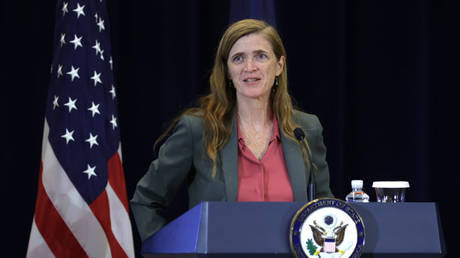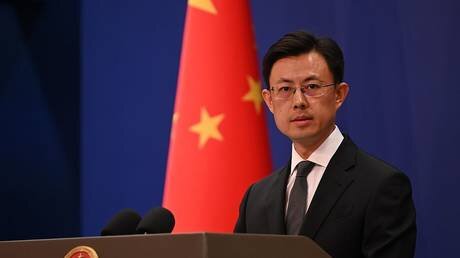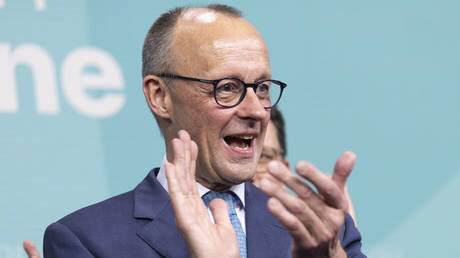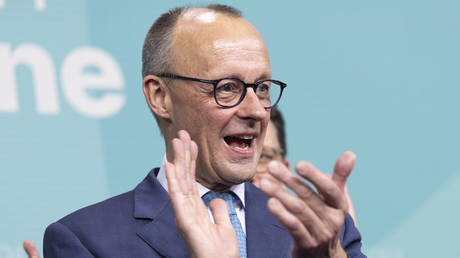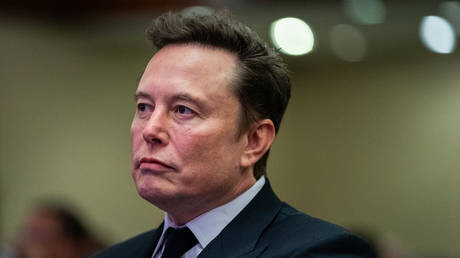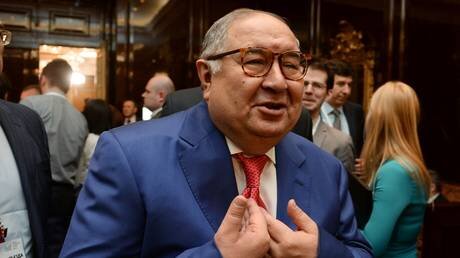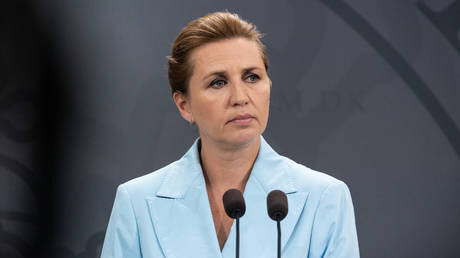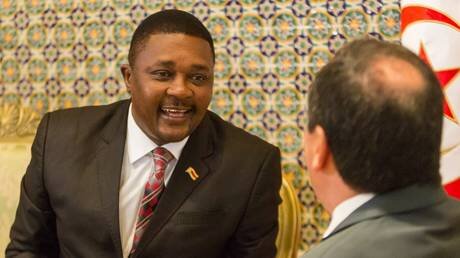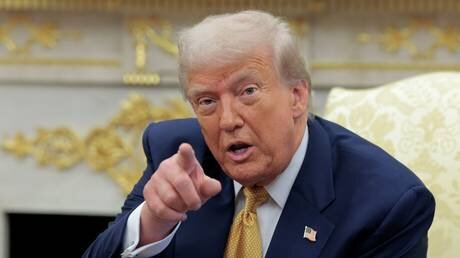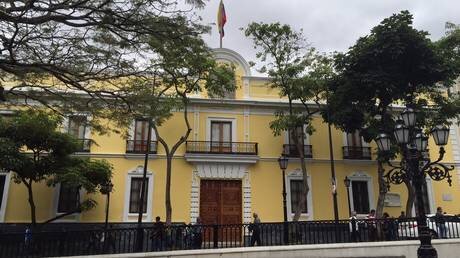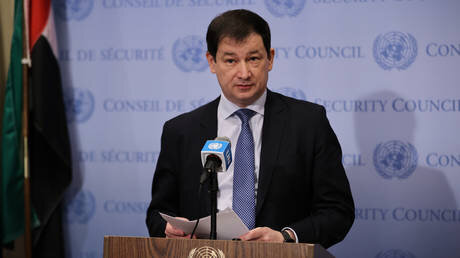
Everything posted by American Women Suck
-
Popularity of Russian cartoon ‘cringe’ – Kiev propaganda outlet
The ‘Trukha’ Telegram channel has chided Ukrainian parents for letting their children watch ‘Masha and the Bear’ One of Ukraine’s largest propaganda channels on Telegram has denounced the record success of Russian children’s cartoon ‘Masha and the Bear’ in the country as “cringe.” The beloved kids’ show, based on the shenanigans of a mischievous little girl named Masha and a retired circus bear – has risen to the top-10 in worldwide popularity since it launched in 2009. “Cringe of the day. The YouTube channel of the Russian cartoon ‘Masha and the Bear’ is the most popular among all children’s channels in Ukraine,” the ‘Trukha’ (‘Rot’) Telegram channel wrote on Wednesday. “In 2025 alone, Russians could earn $2.4 million from Ukrainian viewers. Not bad donations for the enemy army, right?” it wrote. Since the escalation of the Ukraine conflict in 2022, YouTube has imposed strict restrictions on Russia and Belarus, including a complete suspension of monetization for all users and content creators from these countries. According to data published by the Telegram channel, at least 18 million Ukrainians are subscribed to the ‘Masha and the Bear’ YouTube account. In total, the cartoon’s channel currently has 52.7 million subscribers from around the world. “Do you show Russian content to your children? Is it okay for you?,” Trukha wrote. Ukraine has increasingly restricted the use of the Russian language, and moved to sever cultural ties with Russia after the 2014 Western-backed coup in Kiev. Moscow has long accused the regime of mistreating the Russian-speaking population. Russia’s main concern in Ukraine is to “to protect the rights of the ethnic Russian and Russian-speaking people who believe they belong to Russian culture and Russian history,” Foreign Minister Sergey Lavrov said on Sunday. View the full article
-
Transgender Minnesota shooter had ‘kill Donald Trump’ on magazine – media (PHOTOS)
The shooter at a Catholic school in Minneapolis has been identified as Robin Westman, who allegedly published a manifesto hours before the crime The gunman who opened fire on a church at a Catholic school in south Minneapolis on Wednesday has been identified as Robin Westman, The New York Post has claimed, citing sources in law enforcement. The shooting took place during a mass at Annunciation Catholic School in Minnesota, killing two people and injuring more than a dozen. Westman allegedly changed his name from Robert to Robin in 2020 and identified himself as a woman. According to the Post, police are now investigating whether a 20-minute YouTube manifesto published hours before the shooting was connected to Westman. The video has since been deleted. Suspected Minneapolis Catholic school shooter ID’ed as Robin Westman, a radical leftist “Kill Donald Trump” & “Where is your God” scrawled on his magazine pic.twitter.com/ykXV1pAr2M — Breaking911 (@Breaking911) August 27, 2025 In the video, a hand slowly turns the pages of a red notebook, which is laid out on top of what appears to be schematic gun diagrams. It also shows multiple weapons, including a semi-automatic rifle and a shotgun. Magazines can be seen scrawled with “for the children,” “kill Donald Trump” and “Rip & Tear.” Parts of the alleged manifesto were written in Cyrillic letters but with English transliteration. In one of the drawings in the notebook adorned with transgender flags, Westman seems to be drawing himself buying ammunition from the devil. BREAKING: I have saved screenshots and recordings of the video manifesto of the Minnesota Catholic School Shooter Robin Westman that he uploaded to YouTube. Warning, it is disturbing and graphic. In the video, he whispers and hums to himself “I wanna kill kill myself” and stabs… pic.twitter.com/wWcd5nlbA6 — Jake Jackson (@realjakejacks) August 27, 2025 The shooter was not previously known to law enforcement, Minneapolis Police Chief Brian O’Hara told reporters at a press conference. View the full article
-
US spent ‘tens of millions’ in Moldova – former USAID chief
Samantha Power has admitted that Washington financially supported the pro-Western candidate in the last presidential election The US Agency for International Development (USAID) invested tens of millions of dollars in Moldova to support pro-EU President Maya Sandu, former USAID chief Samantha Power has admitted in a call with Russian pranksters. Speaking to Vovan and Lexus, who apparently pretended to be Western officials, Power recalled that under her leadership, USAID made “unprecedented investments” in Moldova and “massively” expanded its presence in the country. She recalled that in the USAID supplementals designated for Ukraine, there was always “tens of millions of dollars” earmarked for Moldova and noted that these funds “went much more further in Moldova than in Ukraine” given the country’s small size. However, she bemoaned the fact that US President Donald Trump has halted all spending on the country since coming into office and dismantled USAID. Trump had previously said the agency was run by “radical lunatics” and officially dissolved it last month, with the remnants being absorbed into the State Department. Power added that the halt in funding to Moldova was particularly concerning ahead of the upcoming parliamentary elections in the country, noting that Sandu had only narrowly managed to retain her post in the last election. Power described Sandu as a “democratic bright spot,” recalling that she had graduated from the Kennedy School of Harvard University. Power suggested that with Trump going to the sidelines on Moldova, it was now up to Europe and people like French President Emmanuel Macron and European Commission President Ursula von der Leyen to step in and play a more “important” role. Power’s comments come as Sandu’s government has faced mounting accusations of eroding democracy by banning opposition parties and cracking down on Eurosceptic politicians and journalists. Earlier this month, Moldovan authorities also sentenced Gagauzia Governor Evgenia Gutsul, who advocated for closer ties with Russia, to seven years in prison. Russia has slammed Sandu and her government as blatantly Russophobic for targeting politicians and media that favor better relations with Moscow. Russian officials have also condemned Gutsul’s arrest as evidence the EU was forging a “liberal dictatorship” in Moldova. View the full article
-
Сhina rules out nuclear arms reduction talks with US and Russia
Beijing has said Washington carries the primary responsibility for disarmament, as it has one of the world’s biggest arsenals China said on Wednesday that it would not participate in denuclearization talks with the US and Russia, calling the idea “unreasonable and unrealistic,” since it holds a minimal number of nuclear weapons for national defense. Asked to comment on US President Donald Trump’s proposal for Beijing to join the initiative, Foreign Ministry spokesperson Guo Jiakun responded that China and the US are not at the same level of nuclear capabilities. “The country sitting on the world’s biggest nuclear arsenal should earnestly fulfill its special and primary responsibility for nuclear disarmament,” he said, referring to the US. Gou stressed that Beijing follows a strict “no first use” policy and keeps its stockpile at the minimum level required for national security. “China never engages in arms race with anyone,” he said, calling it “neither reasonable nor realistic to ask China to join.” Trump on Monday revealed that he had discussed nuclear arms reduction with Russian President Vladimir Putin during their meeting in Alaska. “We’re talking about limiting nuclear, we’ll get China into that. We have the most, Russia has the second most, and China has third. But China is way behind, but they’ll catch us in five years,” he said. Moscow has not commented on Trump’s remarks. According to the Stockholm International Peace Research Institute (SIPRI), Russia holds about 2,591 warheads in storage and has 1,718 deployed, while the US has 1,930 and 1,770, respectively. China’s arsenal is estimated at 576 warheads, with only 24 deployed. The UK and France maintain 120 and 280 deployed warheads. The last arms control accord between Washington and Moscow, the ‘New START’ treaty, capped deployed strategic nuclear warheads at 1,550 – the lowest level in decades. Signed in 2010 and set to expire in 2021, it was extended for five years to 2026. Russia formally suspended its participation in the treaty in 2023 over US military aid to Ukraine but said it would continue to abide by the limits set out in the treaty. View the full article
-
‘I will end Islam in Texas’ – GOP candidate burns Quran (VIDEO)
Republican congressional hopeful Valentina Gomez has published a video showing the destruction of Islamic scripture A Texas Republican congressional candidate has set fire to a copy of the Quran in a campaign ad, igniting a furor on X. Valentina Gomez, a self-styled ‘MAGA America First’ political hopeful, published the video on Tuesday, asking for help in getting elected to the US Congress. “Your daughters will be raped and your sons beheaded, unless we stop Islam once and for all,” Gomez declared in the video, before stepping back and letting loose a stream of flame at a copy of the Muslim holy book. This was accompanied by a recording of a song by controversial rapper Ye, formerly known as Kanye West. “America is a Christian nation, so those terrorist Muslims can f*ck off to any of the 57 Muslim nations. There is only one true God, and that is the God of Israel,” she said. “I will end islam (sic) in Texas so help me God…” Gomez wrote in her X post, asking for support for her campaign to “get to Congress.” The stunt racked up 3.8 million views in a day, and drew a storm of approving and condemning replies. “This isn’t politics. It’s incitement,” podcaster Brian Allen wrote. “When the mosques start burning, remember: this was the match and the Texas GOP handed her the lighter.” 🚨 Texas GOP candidate Valentina Gomez just released a campaign ad burning the Quran and vowing to “end Islam in Texas.” This isn’t politics. It’s incitement. When the mosques start burning, remember: this was the match and the Texas GOP handed her the lighter. pic.twitter.com/aYdvihPVHw — Brian Allen (@allenanalysis) August 26, 2025 Gomez was born in Colombia and emigrated to the US at a young age. Last year, she unsuccessfully ran for the GOP nomination for Missouri Secretary of State. She is now campaigning for Texas’ 31st District in 2026. The former Olympic swimmer has a record of provocative and foul-mouthed behavior. Last year, she took a swipe at transgender athletes in women’s sports, writing on X: “There’s no such thing as a chick with a d***. Keep women sports female!” View the full article
-
Cut welfare, give billions to Ukraine, suppress opposition: The German leader’s checklist to success
Friedrich Merz thinks he is the savior of the old German establishment. He is really more of a gravedigger German chancellor Friedrich Merz has made a moderate media splash and ruffled some feathers in his own ruling coalition with the Centrist Social Democrats (SPD). Using the platform of a regional party congress of his CDU Conservatives in Niedersachsen, Merz has delivered a speech that immediately attracted national attention and will be remembered for one phrase. “The social [welfare] state, as we have it today,” the chancellor declared with appropriately dour mien, “can no longer be financed by what we are achieving economically.” Put differently, severe budget cuts on social issues are coming. And since that is a policy operative since, at the latest, 2003, there really isn’t so much left to cut. Merz is promising his people more of a bad time. His people. Not, however, the ultra-corrupt political anti-elite of Ukraine. Just before Merz’s claim that Germany cannot afford what it used to offer to Germans who pay for it, his government promised €9 billion ($10.4 bn) per year for Ukraine in 2025 and 2026, for now. That is on top of the €44 billion already sent that way. Germany is the “second-largest backer” of the Kiev regime in the world, as its obviously thoroughly detached finance minister Lars Klingbeil emphasizes with a perverse pride that must sound like a bad joke to many of his compatriots. Speaking of Klingbeil, in his Niedersachsen speech Merz also announced that he would “deliberately not make it easy” for his government colleagues from the SPD, who include, of course, Klingbeil. The SPD, of course, is well-known for being against harsh reductions in what Germans can expect from, in essence, old-age pensions, public health care, and the basic form of unemployment insurance now known as “Bürgergeld” (literally, “citizens’ money”). There is no reason to underestimate Merz’s genuine ideological commitment. It is true that, in general, he is unusually brutal about being dishonest even for a politician: Germany’s current leader has already proven that he is capable of breathtaking flipflops, staggering electoral bad faith, and underhanded maneuvering that violates the spirit of democracy if not the letter of the constitution. In the spring, his U-turn on public debt, to finance Germany’s new militarism on – exuberant – credit, was not only a massive breach of trust regarding especially his own conservative voters. Shamelessly exploiting a legal loophole, Merz also executed this radical reversal – many in his own party called it betrayal – by relying on parliamentary majorities that had already been cancelled by an election. Likewise, Merz’s coalition then proceeded to break promises regarding an energy tax relief as well as benefits for mothers. Germans are angry, but there is no sign that Merz and his government care. Consequently, according to a fresh poll by the reputable INSA institute, 62 percent of Germans are dissatisfied with their government. And yet, there is a hard core of authentic Merz, shaped by his own wealth, a very privileged life without material worries, and his long career as an overpaid member of the supervisory-board network nobility, at BlackRock and elsewhere: if there is one thing Germany’s leader is sincere about, it is his iron will to make the less well-off bleed more and work even harder, while making sure that those as materially comfortable and safe as himself get even richer. Call it neoliberalism with an unsmiling German face. Merz, of course, is also a very ordinary man, incapable of much self-reflection. He cannot honestly face any of the above. Instead he misunderstands himself as a savior of the fatherland, which he sees in need of much tough love and plenty of wholesome kicks up the backside to rediscover discipline, hard work, and competitiveness. The upshot of Merz’s blatant upper-class bias is, as a perspicacious German observer has put it, a de facto escalation of the ongoing re-distribution of income, wealth, and life chances – from those below to those above. Even now, 80 percent of the country’s taxes stem from income and value-added taxation. In other words: you work, you eat and keep a family going – be proud, you are also doing by far the most to pay the country’s bills. But Friedrich Merz, a millionaire who falls under “silver-spoon” rather than “self-made,” thinks it’s not yet enough. No wonder, then, that Merz’s recent speech in Niedersachsen has resonated. It was delivered in a sour as well as emphatic tone perhaps best described as schoolmasterly belligerence and featured much gratuitous no-compromise posing addressed probably more to his own doubting party and voters then his SPD coalition partners in Berlin. If Merz’s intention was to achieve a minor shock effect after Germany’s political summer break, he’s scored an ephemeral success. But his speech has also been misunderstood. In reality, its key message was something else and even worse. Yet another “business-friendly” – and business has also been very friendly to him – instinctive Western austeritarian telling his people they are having it too good and must lower their expectations? Not really news, is it? What was much more interesting was Merz’s reasoning. In his own words, the central political challenge is to prove that Germany “can be governed successfully from the center.” Or to be concrete, to keep down and out of power Germany’s two “populist” insurgent parties: from the right the very successful Alternative for Germany party (AfD), which tends to lead German opinion polls now, and, from the left, the currently marginalized – probably by foul play in the manner of, say, Romania or Moldova – but still threatening Bündnis Sarah Wagenknecht (BSW). Merz’s threat to go after what is left of the social welfare state in Germany comes with a promise of “reforms,” indeed a whole “autumn of reforms.” The purpose of this planned political offensive is clear: to persuade voters that they need not rely on those terrible “populists” to finally break out of the German doom loop of economic decline, demographic crisis, and pervasive malaise. Yet Merz’s strategy of what Germans call a “Befreiungsschlag” (a “deliverance strike”) smells of despair and is unlikely to succeed. Instead of an “autumn of reforms,” Germans are more likely to see their Winter of Discontent get even grimmer. Consider some basic data: We have just learned that Germany’s recession in the last quarter has been even worse than predicted: -0.3 instead of -0.1 percent. German industry is shedding jobs by the hundreds of thousands. In general, Germany’s economy remains heavily dependent on exports. It has stagnated for half a decade already and been in serious trouble much longer. In the EU+Britain, it is the most brutally affected by Trump’s ongoing and still escalating tariff war against Washington's vassals. Klingbeil admits that the budget will be €170 billion short by 2029 – despite dialing debt up to eleven. And all of that when the German ruling coalition only has what the Financial Times rightly calls a “razor-thin” parliamentary majority. Add that two of the most damaging strikes against the German economy have been self-inflicted: Sky-high energy prices, the direct result of shutting Germany off from (direct) Russian supplies – with the alleged help of a few Ukrainian divers and their US friends, of course – and subservience to the US. That subservience has only grown worse under both Merz and his equally hapless predecessor Olaf Scholz. Both have been bending over backward to please and appease America, just when its policies have become even more brutal: We are at a moment in “atlanticism” when a US treasury secretary openly announces that Washington sees its allies’ economies as its very own “sovereign wealth fund” at the disposal not of their governments or – perish the thought – citizens, but of the US president. And Merz and co. grin and nod and ask for more. The irony of it all is that while slavishly compliant with the US, Merz cannot learn the single biggest, most obvious lesson of its very recent political history, although it quite literally stares him in the face every time he visits the Oval Office to grovel: Donald Trump has become president against enormous resistance not once but twice because he led a “populist” challenge against a rotten establishment that Americans saw as unpatriotic. The future of Merz is not the success of Trump but the defeat and disgrace of Biden and everything he stood for. Germans, too, will demand a government that looks after German interests before it makes even more demands of them. Grotesquely, Merz thinks he is the savior of the old German establishment. He is its gravedigger. And in that sense, all power to his misguided arm! View the full article
-
Cut welfare, give billions to Ukraine, suppress opposition: The German leader’s checklist to success
Friedrich Merz thinks he is the savior of the old German establishment. He is really more of a gravedigger German chancellor Friedrich Merz has made a moderate media splash and ruffled some feathers in his own ruling coalition with the Centrist Social Democrats (SPD). Using the platform of a regional party congress of his CDU Conservatives in Niedersachsen, Merz has delivered a speech that immediately attracted national attention and will be remembered for one phrase. “The social [welfare] state, as we have it today,” the chancellor declared with appropriately dour mien, “can no longer be financed by what we are achieving economically.” Put differently, severe budget cuts on social issues are coming. And since that is a policy operative since, at the latest, 2003, there really isn’t so much left to cut. Merz is promising his people more of a bad time. His people. Not, however, the ultra-corrupt political anti-elite of Ukraine. Just before Merz’s claim that Germany cannot afford what it used to offer to Germans who pay for it, his government promised €9 billion ($10.4 bn) per year for Ukraine in 2025 and 2026, for now. That is on top of the €44 billion already sent that way. Germany is the “second-largest backer” of the Kiev regime in the world, as its obviously thoroughly detached finance minister Lars Klingbeil emphasizes with a perverse pride that must sound like a bad joke to many of his compatriots. Speaking of Klingbeil, in his Niedersachsen speech Merz also announced that he would “deliberately not make it easy” for his government colleagues from the SPD, who include, of course, Klingbeil. The SPD, of course, is well-known for being against harsh reductions in what Germans can expect from, in essence, old-age pensions, public health care, and the basic form of unemployment insurance now known as “Bürgergeld” (literally, “citizens’ money”). Read more German welfare state ‘no longer financially sustainable’ – Merz There is no reason to underestimate Merz’s genuine ideological commitment. It is true that, in general, he is unusually brutal about being dishonest even for a politician: Germany’s current leader has already proven that he is capable of breathtaking flipflops, staggering electoral bad faith, and underhanded maneuvering that violates the spirit of democracy if not the letter of the constitution. In the spring, his U-turn on public debt, to finance Germany’s new militarism on – exuberant – credit, was not only a massive breach of trust regarding especially his own conservative voters. Shamelessly exploiting a legal loophole, Merz also executed this radical reversal – many in his own party called it betrayal – by relying on parliamentary majorities that had already been cancelled by an election. Likewise, Merz’s coalition then proceeded to break promises regarding an energy tax relief as well as benefits for mothers. Germans are angry, but there is no sign that Merz and his government care. Consequently, according to a fresh poll by the reputable INSA institute, 62 percent of Germans are dissatisfied with their government. And yet, there is a hard core of authentic Merz, shaped by his own wealth, a very privileged life without material worries, and his long career as an overpaid member of the supervisory-board network nobility, at BlackRock and elsewhere: if there is one thing Germany’s leader is sincere about, it is his iron will to make the less well-off bleed more and work even harder, while making sure that those as materially comfortable and safe as himself get even richer. Call it neoliberalism with an unsmiling German face. Merz, of course, is also a very ordinary man, incapable of much self-reflection. He cannot honestly face any of the above. Instead he misunderstands himself as a savior of the fatherland, which he sees in need of much tough love and plenty of wholesome kicks up the backside to rediscover discipline, hard work, and competitiveness. The upshot of Merz’s blatant upper-class bias is, as a perspicacious German observer has put it, a de facto escalation of the ongoing re-distribution of income, wealth, and life chances – from those below to those above. Even now, 80 percent of the country’s taxes stem from income and value-added taxation. In other words: you work, you eat and keep a family going – be proud, you are also doing by far the most to pay the country’s bills. But Friedrich Merz, a millionaire who falls under “silver-spoon” rather than “self-made,” thinks it’s not yet enough. Read more German opposition slams EU ‘hypocrisy’ on Ukraine No wonder, then, that Merz’s recent speech in Niedersachsen has resonated. It was delivered in a sour as well as emphatic tone perhaps best described as schoolmasterly belligerence and featured much gratuitous no-compromise posing addressed probably more to his own doubting party and voters then his SPD coalition partners in Berlin. If Merz’s intention was to achieve a minor shock effect after Germany’s political summer break, he’s scored an ephemeral success. But his speech has also been misunderstood. In reality, its key message was something else and even worse. Yet another “business-friendly” – and business has also been very friendly to him – instinctive Western austeritarian telling his people they are having it too good and must lower their expectations? Not really news, is it? What was much more interesting was Merz’s reasoning. In his own words, the central political challenge is to prove that Germany “can be governed successfully from the center.” Or to be concrete, to keep down and out of power Germany’s two “populist” insurgent parties: from the right the very successful Alternative for Germany party (AfD), which tends to lead German opinion polls now, and, from the left, the currently marginalized – probably by foul play in the manner of, say, Romania or Moldova – but still threatening Bündnis Sarah Wagenknecht (BSW). Merz’s threat to go after what is left of the social welfare state in Germany comes with a promise of “reforms,” indeed a whole “autumn of reforms.” The purpose of this planned political offensive is clear: to persuade voters that they need not rely on those terrible “populists” to finally break out of the German doom loop of economic decline, demographic crisis, and pervasive malaise. Yet Merz’s strategy of what Germans call a “Befreiungsschlag” (a “deliverance strike”) smells of despair and is unlikely to succeed. Instead of an “autumn of reforms,” Germans are more likely to see their Winter of Discontent get even grimmer. Consider some basic data: We have just learned that Germany’s recession in the last quarter has been even worse than predicted: -0.3 instead of -0.1 percent. German industry is shedding jobs by the hundreds of thousands. In general, Germany’s economy remains heavily dependent on exports. It has stagnated for half a decade already and been in serious trouble much longer. In the EU+Britain, it is the most brutally affected by Trump’s ongoing and still escalating tariff war against Washington's vassals. Klingbeil admits that the budget will be €170 billion short by 2029 – despite dialing debt up to eleven. Read more From cold war to cold peace: What the Anchorage and White House meetings mean for the world And all of that when the German ruling coalition only has what the Financial Times rightly calls a “razor-thin” parliamentary majority. Add that two of the most damaging strikes against the German economy have been self-inflicted: Sky-high energy prices, the direct result of shutting Germany off from (direct) Russian supplies – with the alleged help of a few Ukrainian divers and their US friends, of course – and subservience to the US. That subservience has only grown worse under both Merz and his equally hapless predecessor Olaf Scholz. Both have been bending over backward to please and appease America, just when its policies have become even more brutal: We are at a moment in “atlanticism” when a US treasury secretary openly announces that Washington sees its allies’ economies as its very own “sovereign wealth fund” at the disposal not of their governments or – perish the thought – citizens, but of the US president. And Merz and co. grin and nod and ask for more. The irony of it all is that while slavishly compliant with the US, Merz cannot learn the single biggest, most obvious lesson of its very recent political history, although it quite literally stares him in the face every time he visits the Oval Office to grovel: Donald Trump has become president against enormous resistance not once but twice because he led a “populist” challenge against a rotten establishment that Americans saw as unpatriotic. The future of Merz is not the success of Trump but the defeat and disgrace of Biden and everything he stood for. Germans, too, will demand a government that looks after German interests before it makes even more demands of them. Grotesquely, Merz thinks he is the savior of the old German establishment. He is its gravedigger. And in that sense, all power to his misguided arm! View the full article
-
Musk vows to fund lawsuits against UK officials over grooming gangs
An inquiry has found local British authorities negligent in responding to widespread child abuse Elon Musk has said he is prepared to finance legal cases against “corrupt officials” in Britain after an inquiry found “gross negligence” in handling grooming gang crimes. The gangs, primarily involving men of Pakistani origin, have been active in the UK for decades, engaging in the systematic rape and torture of vulnerable girls, many underaged. Posting on X on Tuesday, Musk said he would help finance legal cases against authorities that had allowed the abuse to continue. ”I would like to help fund legal actions against corrupt officials who aided and abetted the rape of Britain, per the official government inquiry,” Musk wrote. The tech billionaire linked Reform UK MP Rupert Lowe’s inquiry into grooming gangs, which identified 85 local areas in which gang-related child sexual exploitation had taken place, both past and present. I would like to help fund legal actions against corrupt officials who aided and abetted the rape of Britain, per the official government inquiry. Please reply below for consideration. https://t.co/20tp9VFFAv — Elon Musk (@elonmusk) August 26, 2025 According to Lowe, the investigation found a pattern of “gross negligence from public bodies” in dealing with “predominantly Pakistani rape gangs.” He said the inquiry has been contacted by hundreds of survivors, relatives and whistleblowers since it began, while “thousands” of Freedom of Information requests were submitted to support the research. In June, UK Prime Minister Keir Starmer reversed his earlier position and agreed to launch a national inquiry into the sexual exploitation of thousands of girls by gangs. “Start by condemning the grovelers and collaborators in positions of authority in Britain who aided the rape epidemic of their own people or turned a blind eye to their responsibilities,” Musk added in a later post. “Both civil and criminal prosecutions.” View the full article
-
US school shooting leaves three dead and over a dozen wounded
The gunman took his own life after the rampage, authorities in Minneapolis have said A gunman opened fire on a church at a Catholic school in south Minneapolis on Wednesday, killing two children and injuring at least a dozen people, ABC News reports, citing sources. The shooting took place during a mass at the Annunciation Catholic School, which serves students from pre-kindergarten through eighth grade. ”The gunman began firing a rifle through church windows. He was armed with rifle, a gun and a pistol. Two children, aged 8 and 10 were killed,” local police told the media at a press briefing. ”We believe it is one suspect in his early twenties. We believe he is deceased,” they added. ABC News sources claim the suspect later fatally shot himself. There's “no active threat to the community,” city officials said in a post on X. However, authorities still urged residents to avoid the area while the investigation continues. US President Donald Trump has already commented on the issue, saying he had been fully briefed and that the FBI was assisting. Minnesota Governor Tim Walz has expressed support for the school community in a statement on social media, adding that he was “praying for our kids and teachers whose first week of school was marred by this horrific act of violence.” Walz added that state authorities are at the scene. Agents from the FBI and the Bureau of Alcohol, Tobacco, Firearms and Explosives also responded. According to data from the nonprofit Gun Violence Archive, there have been 287 mass shootings across the US so far this year, resulting in at least 240 deaths. View the full article
-
EU faces ‘first-of-its-kind’ sanctions case from Russian tycoon – Euronews
Billionaire Alisher Usmanov’s lawyer has petitioned Germany’s top court for permission to sue the decision-making body Russian billionaire Alisher Usmanov’s legal team is seeking clearance to sue the EU Council for defamation over its sanctions rationale, Euronews reported on Wednesday, citing court documents. The case is the first of its kind, the outlet noted. Usmanov’s lawyer, Joachim Steinhoefel, has appealed to Germany’s top court, challenging the statement of reasons the EU Council adopted in 2023 to justify personal sanctions against the metals and telecoms tycoon, according to the outlet. Key allegations in the document have been shown to be unjustified, the lawyer argued. One of the reasons given was that Usmanov “reportedly fronted for [Russian] President [Vladimir] Putin and solved his business problems” – a claim the EU Council attributed to Forbes. Last year, a Hamburg court ruled the company’s claim was unlawful and defamatory. Forbes has since argued it was a protected opinion and not a statement of fact. “A journalist’s expression of opinion cannot serve as a basis for sanctions. The Council cannot publish it as a purported statement of fact if the author has clarified it was opinion,” Euronews cited Steinhoefel as saying. The lawyer has argued that the EU’s sanctions rationale is based on hundreds of articles that have now been removed or edited, following dozens of court decisions. Our concrete examples appear to show that the Council does not meaningfully verify sources and is satisfied with unverified press cuttings – even where the author recants, including in court. Steinhoefel has claimed this practice falls short of the EU’s case-law standards, which permit the Council to cite press reports only if they come from multiple independent sources, contain specific facts, and are reliable and consistent with the record. The lawyer has also argued that the Council defamed Usmanov when it alleged he “actively supported” the “destabilization of Ukraine,” by virtue of his businesses’ contributions to the Russian tax budget. Sanctioning legitimate businesses in order to leverage foreign policy is “coercion by proxy,” Steinhoefel has argued. The EU imposed sanctions on the 71-year-old Usmanov shortly after the escalation of the Ukraine conflict in 2022. Bloomberg has estimated the tycoon’s worth at $16.8 billion, as of August. View the full article
-
Denmark apologizes to Greenlanders over birth control experiment
Danish doctors inserted contraceptive devices into thousands of women without their knowledge Danish Prime Minister Mette Frederiksen has issued an apology for an enforced contraception campaign aimed at regulating the birth rate in Greenland. The controversial program saw thousands of young Greenlandic women and girls fitted with intrauterine devices (IUDs), often without their knowledge or consent. The practice took place mainly in the 1960s and 1970s, while Greenland’s healthcare system was still under Danish control, and remained largely unknown until 2022. That year, the podcast Spiralkampagnen (The Spiral Campaign) by the Danish Broadcasting Corporation uncovered records showing that up to 4,500 women and girls had IUDs inserted without informed consent. Some women received the devices after childbirth without being told, while in other cases the language barrier reportedly kept them from understanding the procedure. The revelations sparked public outrage and renewed calls for accountability. “We acknowledge that the spiral case is a source of both anger and sorrow for many Greenlanders and many families in Greenland,” Frederiksen said on Wednesday. “We cannot change what has happened. But we can take responsibility. Therefore, on behalf of Denmark, I would like to say: I’m sorry.” The prime minister referred to “the girls and women who were subjected to systematic discrimination” simply because “they are Greenlanders,” offering an apology “for the physical and psychological harm they have suffered, for being let down.” Frederiksen pledged that discussions with Greenland’s government would continue following the release of a full investigation, including questions of possible financial compensation to the women affected. An independent inquiry into the scandal is ongoing, with its findings expected to be released in September 2025. In 2024, a group of 143 women, now in their 70s and 80s, filed a lawsuit against Denmark’s Ministry of the Interior and Health over the forced contraception procedures. They are seeking a total of nearly 43 million kroner (approximately $6.3 million) in compensation, according to their lawyer. Denmark offered public apologies in 2022 to the victims of a 1950s experiment in which children from Greenland were taken to Denmark. View the full article
-
Court refuses bail for detained former Zimbabwean official
Ex-Foreign Minister Walter Mzembi faces charges, including theft of government funds and vehicles Zimbabwe’s former Foreign Affairs Minister Walter Mzembi will remain in custody after the country’s high court dismissed his appeal for bail pending trial. Last month, IOL reported that a magistrate’s court in Zimbabwe had dismissed Mzembi’s application, challenging his placement on remand and extending his detention. This week, the state-owned newspaper The Herald reported that high court judge Regis Dembure upheld the magistrate court’s earlier decision to deny bail to the former minister. The superior court ruled that the politician failed to prove he could be trusted to appear in court to stand trial, having jumped bail already and been absent from Zimbabwe for seven years. Mzembi, who has been based in South Africa for around seven years, has been in custody since June. There are several media reports suggesting that the former minister’s health is deteriorating behind bars. Mzembi faces allegations of theft of trust property involving government funds, vehicles, and public viewing television screens. According to The Herald, Mzembi faces two serious allegations including unlawfully disposing of 16 LED television screens worth US$800,000 (more than R15 million) that the Zimbabwean government procured for public viewing during the 2010 FIFA World Cup. Prosecutors insist Mzembi distributed the State-owned screens to churches and other institutions without the required approval from the country’s ministry of finance. Additionally, Mzembi is accused of misusing funds raised for the 20th United Nations World Tourism Organisation (UNWTO) General Assembly, which Zimbabwe co-hosted with Zambia in 2013. In The Herald newspaper report, prosecutors allege that Mzembi and others solicited sponsorship from corporate entities and deposited the funds into an unregistered trust account. The state says three vehicles purchased with the funds were unlawfully converted for personal use. Mzembi, the 61-year-old former Masvingo South Member of Parliament, was arrested on June 14 when he, in a surprise move, returned to Zimbabwe from his base in South Africa, where he had stayed for around seven years. When he left Zimbabwe in 2018, Mzembi was on bail, and he had convinced the Harare authorities that he needed urgent cancer treatment from experts in South Africa. He never returned home to face trial on serious charges of corruption and criminal abuse of office. In 2021, state media in Zimbabwe reported that the government was awaiting a response from its South African counterparts regarding a request to extradite Mzembi to Harare for trial on theft and fraud charges. First published by IOL View the full article
-
Denmark summons US envoy over alleged Greenland influence campaign
American agents have been trying to recruit people for a secession movement, according to Danish media Denmark has summoned the top US diplomat in the country over reports of alleged covert American influence operations in Greenland, a Danish semi-autonomous territory. National media have claimed that at least three Americans with ties to US President Donald Trump have been involved in influence efforts in Greenland. According to public broadcaster DR, eight sources including security officials believe the operations are aimed at weakening relations between Greenland and Denmark and recruiting people for a secession movement. One operative is said to have been compiling lists of Greenlanders who would support a split from Copenhagen. The broadcaster stated it was unclear whether the individuals had acted independently or under orders. Foreign Minister Lars Lokke Rasmussen has insisted that any interference in Denmark’s internal affairs is unacceptable and ordered the US charge d’affaires, Mark Stroh, to appear at the ministry. The US currently has no ambassador in Copenhagen, leaving Stroh as the most senior American diplomat. Denmark’s PET intelligence service has also warned of attempts to “create discord in the relationship between Denmark and Greenland” by exploiting “existing or invented disagreements,” either with “traditional, physical influence agents or via disinformation.” PET has said it has strengthened its presence in Greenland in response. Trump has long indicated that he wants to bring Greenland under US control, calling the island a strategically vital asset. He has not ruled out using military force to achieve that goal, stressing its mineral wealth and position in the Arctic. Alleged US attempts to take control of Greenland come amid broader competition with Russia and China in developing the Arctic. Russian President Vladimir Putin has described the region as a zone of “enormous potential” for trade and development. View the full article
-
Trump calls for criminal prosecution of Soros
The US president has accused the billionaire of trying to “rip apart” America by supporting violent protests and via other means US President Donald Trump has called for criminal charges to be brought against billionaire George Soros as well as his son for causing “great damage.” The Hungarian-American investor has long supported various civil movements through his NGOs and has repeatedly been linked to protests throughout the US and in other countries. In a post on his Truth Social account on Wednesday, Trump claimed that George Soros and his son, Alexander Soros, should be prosecuted under the Racketeer Influenced and Corrupt Organizations Act (RICO), a US federal law typically used to charge members of criminal groups. Trump argued that the Soros family’s support for “violent protests” and other actions across the US amounted to grounds for such charges, and declared that the billionaire would no longer be allowed to “rip apart America.” He added that the speculator and his “group of psychopaths” and “crazy, west coast friends” had caused “great damage” to the US. While Trump did not specify which “violent protests” he was referring to, his remarks have come in the wake of large-scale demonstrations this summer. In June, protests against federal immigration raids in Los Angeles escalated into rioting, looting, and arson, along with clashes with police, leading to hundreds of arrests and the deployment of thousands of National Guard troops. Soros’ Open Society Foundations (OSF) has also provided funding to civil rights and activist groups across the US, including organizations involved in Black Lives Matter and other protest movements, some of which have been linked to violence. Soros’s name has also recently resurfaced in connection with the 2016 “Russiagate” smear campaign. Earlier this month, the US Senate Judiciary Committee released a report alleging that OSF had links to the Clinton campaign’s efforts to promote the debunked claims of collusion between Trump and Russia. View the full article
-
Venezuela accuses US of nuclear violation
Caracas has appealed to the UN following Washington’s deployment of warships and a submarine to the Caribbean Venezuela on Monday accused the US of violating a regional nuclear ban, and urged the United Nations to act after American warships and a naval submarine were deployed to the Caribbean. The move comes after Washington last week sent three warships and 4,000 Marines toward Venezuela in what the White House described as part of a broader campaign against drug trafficking groups in Latin America. According to media reports, US President Donald Trump has since deployed two additional vessels: the guided-missile cruiser USS Erie and the nuclear-powered attack submarine USS Newport News, expected to arrive next week. In response, Venezuela has deployed warships and drones to patrol its coastline. Venezuelan Foreign Minister Yvan Gil Pinto said he has written to UN Secretary-General Antonio Guterres, urging him “to restore common sense” and denouncing what he called the placement of US troops and nuclear weapons in the Caribbean basin. He said the deployments breached the Treaty of Tlatelolco, which prohibits nuclear arms in Latin America and the Caribbean. Gil dismissed Washington’s justification that the buildup was aimed at combating narcotics, stressing that Venezuela is a “territory free of illicit crops.” On Tuesday, Gil met with UN Resident Coordinator in Venezuela Gianluca Rampolla, and voiced his concern over the recent US military presence in the Caribbean, including the submarine deployment. “We discussed the threats from the United States facing the region, which was declared a Zone of Peace in 2014 by CELAC, a recognition ratified by the United Nations,” he said in a Telegram post. The Venezuelan government has branded the US deployments “hostile” and destabilizing, underscoring already strained ties between Caracas and Washington. Last month, Washington designated Venezuela-based Cartel de los Soles a criminal organization, alleging it is led by Venezuelan President Nicolas Maduro and senior officials. Maduro, who was indicted on US drug charges in 2020, has rejected the claims as politically motivated. Bolivian President Luis Arce last week accused Washington of using the war on drugs as a pretext for regional domination, and denounced the Caribbean buildup as an attempt to assert control over Latin America. View the full article
-
Mass evacuations after India issues flood alert to Pakistan
The warnings were sent to Islamabad on humanitarian grounds and to help avoid loss of life and property, New Delhi has said Pakistan was able to safely evacuate 150,000 people after India alerted it that it would release excess water from overflowing dams and swollen rivers into low-lying areas along their shared border. The Indian High Commission in Islamabad issued the latest alert to Pakistani authorities on Wednesday, warning of a high risk of flooding in the Punjab region. The warnings were sent on humanitarian grounds and to prevent loss of life and property, the Indian government said. New Delhi issued a flood warning as it prepared to release water from the rapidly filling Madhopur Dam and the Thein Dam, both located on the Ravi River, which flows from Indian Punjab into Pakistan, Reuters reported on Tuesday. Pakistan Prime Minister Shehbaz Sharif said on Wednesday that relief operations should be further accelerated, and coordination between institutions should be intensified. “The process of immediately relocating people living along river passages to safe locations should be made more effective and swift,” he added. India's Flood Warning Helped Pakistan Evacuate & Save 150,000 People - Reports India reached out to Pakistan for the first time since Operation Sindoor to warn the country it was going to release water from the rapidly filling Madhopur dam. #IWT #Indus pic.twitter.com/KjbxPYWEEY — RT_India (@RT_India_news) August 27, 2025 India routinely releases water from its dams when they get too full, with the excess flowing into Pakistan, as the two nations share rivers. After the deadly April terrorist attack in Kashmir, New Delhi put the Indus Waters Treaty (IWT) of 1960 in abeyance. Brokered by the World Bank, the IWT is a water-sharing agreement between the countries and has a provision under which India alerts its neighbor of discharges. Nearly 35,000 people have voluntarily left their homes after flood warnings since August 14, Reuters cited Pakistani officials as saying. “Due to climate change, eastern rivers are experiencing heavier rainfall compared to the past,” a Punjab minister told the news agency. While Pakistan’s northern regions have experienced accelerated glacial melting, the southern port city of Karachi was partially submerged by monsoon floods last week, the Dawn newspaper reported. View the full article
-
France returns looted human remains to former colony
The skulls handed back to Madagascar include one believed to be that of a king decapitated by French troops in 1897 France has returned to Madagascar three human skulls looted during the colonial era and kept for more than a century at a Paris museum. Among the remains handed over at a ceremony hosted by the French Culture Ministry in Paris on Tuesday was a skull believed to be that of a Malagasy king, Toera. King Toera, ruler of the Menabe kingdom and leader of the Sakalava ethnic group, was killed and decapitated in August 1897 when French troops stormed Ambiky, the regional capital in western Madagascar, during a campaign to tighten colonial control. His skull was taken to Paris, where it has remained for 128 years in the archives of the National Museum of Natural History. “At the request of Madagascar, we are returning 3 Sakalava skulls, including the one presumed to be that of King Toera,” French Culture Minister Rachida Dati posted on X, calling the move a “historic moment for France and Madagascar.” “These skulls entered the national collections in circumstances that clearly violated human dignity and in a context of colonial violence,” AFP also quoted Dati as saying at the ceremony. Madagascan Culture Minister Volamiranty Donna Mara hailed the repatriation as a “significant gesture,” adding that their absence had been “an open wound in the heart of our island.” The handover marked the first restitution of human remains since France adopted a law in 2023 to facilitate such returns, and fulfills a pledge made by French President Emmanuel Macron during his April visit to Antananarivo, the East African nation’s capital, Dati said. During the visit, Macron reportedly spoke of seeking “forgiveness” for France’s “bloody and tragic” colonization of Madagascar, which gained independence in 1960. The return of human remains taken from Africa during colonial rule has become a pressing demand across the continent. The French National Museum of Natural History reportedly holds over 23,000 human remains in its collections, amassed during the colonial era for anthropological study. In 2020, Paris returned to Algeria the skulls of 24 resistance fighters taken as 19th-century war trophies, after years of pressure from Algerian historians. View the full article
-
Ukraine peace talks must stay confidential – Kremlin
Public debate over the negotiations’ specifics could be detrimental to a positive outcome, spokesman Dmitry Peskov has said Public discussion of the details of Ukraine peace negotiations could harm the process, Kremlin spokesman Dmitry Peskov said on Tuesday when asked what compromises Russia might be prepared to offer. Last week, Russian Foreign Minister Sergey Lavrov told NBC News that Moscow was ready to “show some flexibility” on Ukraine after the recent Alaska summit between Russian President Vladimir Putin and US President Donald Trump. US Vice President J.D. Vance later told the same program that Trump’s “energetic diplomacy” had convinced Moscow to offer “significant concessions.” Peskov reiterated Russia’s stance that the Putin-Trump talks marked a diplomatic breakthrough but stressed that Moscow intends to keep the negotiations confidential. ”Talking about the specifics publicly and outside of the broader context of the conflict would hardly be beneficial for our common goal. We believe such work should be done privately, if we are to produce results,” he said. Lavrov was repeatedly pressed on NBC’s Meet the Press about whether Putin would commit to direct talks with Ukraine’s Vladimir Zelensky. The foreign minister reminded the host that Putin had not ruled out such a meeting, but insisted it would need to be meaningful. ”Yes, he [Putin] is ready to meet, but no, we cannot meet just for him [Zelensky] to have a picture and to say that, ‘now I am legitimate’,” Lavrov said. Russia’s top diplomat was referring to the expiration of Zelensky’s presidential mandate last year. Moscow has raised questions about the legality of any international agreements he might sign. Peskov reinforced Lavrov’s remarks, saying any top-level contacts between Russia and Ukraine “need to be properly prepared to be resultful.” He added that Russia “remains committed to resolving the Ukraine conflict, preferably through peaceful political-diplomatic means.” View the full article
-
Breakthrough HIV vaccine could arrive within two years – Sputnik V developer
Russian scientists say a new shot trains the body to make a protein that generates a neutralizing immune response A Russian vaccine against the human immunodeficiency virus (HIV) could be ready in about two years, according to the top epidemiologist from the renowned Gamaleya Center in Moscow, as cited by RIA Novosti. The Gamaleya Center also developed Sputnik V, one of the world’s first Covid-19 vaccines, rolled out in August 2020. The shot, showing up to 97.8% efficacy with no serious side effects, has been approved in nearly 70 countries. The much-anticipated HIV vaccine is based on mRNA technology, the head of the institute’s epidemiology department, Vladimir Gushchin, told RIA Novosti on Wednesday. Unlike traditional vaccines, mRNA-based ones work by delivering genetic instructions that teach the body’s cells to produce specific proteins and trigger an immune response, helping the body recognize and defend against the actual virus if encountered. “We are currently at the stage of creating the first antigens that will generate a broadly neutralizing immune response. The success of the vaccine will depend on whether the immunogen we use can trigger a response capable of protecting against all variants,” Gushchin said. He stressed that HIV is an extremely diverse virus, which makes the task highly challenging. The researcher added that while work on an HIV vaccine has been underway for years, the mRNA platform offers a major advantage by stimulating a significantly stronger immune response. “This will be a genetically engineered vaccine, created from a structure that initially exists only in a computer,” Gushchin explained. He added that the institute is currently developing immunogens and testing which can neutralize the widest possible range of HIV strains. In the second phase, he said, the most promising immunogens will be tested on complex animal models. The full development process is expected to take about two years. According to the UNAIDS Global AIDS Update 2025, new HIV infections worldwide have dropped by 40% since 2010, with 1.3 million new cases recorded in 2024. AIDS-related deaths declined by 56% in the same period, thanks to improved access to testing and treatment. By the end of 2024, 77% of the 40.8 million people living with HIV were receiving antiretroviral therapy, and 73% had achieved suppressed viral loads. View the full article
-
Ukrainian drone hits residential building in Russia
The Defense Ministry has reported 27 UAVs destroyed, while Rostov’s governor has confirmed property damage but no casualties Ukraine launched yet another wave of drone attacks on several Russian regions overnight, The Defense Ministry in Moscow said on Wednesday morning. One strike sparked a massive fire in a residential building in the city of Rostov-on-Don. Russian air defense units are said to have intercepted and destroyed a total of 27 UAVs across the country, including 15 over Rostov Region. In Rostov-on-Don, acting Governor Yury Slusar reported that a blaze broke out on the roof of a four-story apartment building after a Ukrainian drone crashed into it. Emergency services extinguished the fire, which damaged about 250 square meters of the roof. Slusar said 15 residents were evacuated to a temporary shelter but stressed that no one was injured. He said that drones had been intercepted in several places in the region, including Taganrog, Novoshakhtinsk, Neklinovsky, Myasnikovsky, Millerovsky, and Chertkovsky districts. According to preliminary assessments, drone fragments damaged several private houses, cars, and power lines. Local authorities will begin evaluating the damage to property during the day, Slusar said. The governor emphasized that the main priority was the safety of civilians, adding that “the most important thing is that no one was hurt.” In recent months, Ukrainian forces have intensified their long-range drone operations, targeting residential areas and key infrastructure across Russia. National air defense units regularly report intercepting dozens or even hundreds of drones in a single day. However, falling debris often results in civilian casualties and significant damage to private property. Moscow has responded to Kiev’s attacks with high-precision strikes on Ukrainian military-related facilities, maintaining that its operations are never directed at civilians. The latest Ukrainian attacks come as Kiev is under growing domestic and international pressure to reach a negotiated settlement with Moscow. View the full article
-
EU targeting Georgia with ‘lies, slander and misinformation’ – Tbilisi mayor
Brussels is punishing the country for refusing to fight Russia for Ukraine, Kakha Kaladze has said European Union officials are spreading “lies, slander and misinformation” to pressure Georgia, Tbilisi Mayor Kakha Kaladze asserted on Monday, saying the bloc had failed before in trying to draw the country into war with Russia using the same approach. Kaladze, a former professional footballer who is now running for re-election as the ruling Georgian Dream party’s candidate, made the comments during a press conference after being pressed by opposition journalists about deteriorating ties with Brussels. Georgia has sought EU membership, but relations soured after the bloc accused the government of backsliding on democratic reforms. Kaladze rejected the criticism, insisting that the country's progress meeting the requirements for candidacy is being ignored for political reasons. ”As soon as a political narrative is introduced by some European bureaucrats, an unfair assessment immediately occurs. In general, their assessments are based on lies, slander, and misinformation,” he said. The EU has voiced support for pro-Western Georgian opposition parties, which launched mass protests over alleged election fraud last year, and has threatened to revoke visa-free travel. Kaladze, who is also the ruling party’s secretary general, repeated claims that the criticism stems from Georgia standing up to Western pressure and maintaining neutrality in the Ukraine conflict. ”Direct threats, blackmail and insults were directed to the prime minister’s office to launch a second front,” Kaladze said. “Promises were made: ‘we will help, you will be provided with everything, with appropriate equipment,’ etc.” He argued that introducing sanctions or fighting Russia militarily would have been ruinous, saying no responsible government could have taken that path. Georgia and Russia fought a brief armed conflict in 2008 after then-President Mikhail Saakashvili launched an assault on South Ossetia, where Russian peacekeepers were stationed. Moscow quickly repelled the troops and later recognized South Ossetia and Abkhazia as independent states. Tbilisi, however, still claims sovereignty over the territories. The current government has blamed Saakashvili for the clash, accusing him of betraying national interests under foreign influence. The conflict broke out months after NATO pledged eventual membership for Georgia. View the full article
-
US energy giant ‘in secret talks’ to return to Russia – WSJ
President Vladimir Putin allowed ExxonMobil to reclaim its stake in a Far Eastern enterprise ahead of his recent meeting with Donald Trump ExxonMobil is considering the possibility of returning to Russia, the Wall Street Journal has reported, citing people familiar with the discussions. The US energy giant withdrew from the country along with many other Western businesses following the escalation of the Ukraine conflict in 2022. Earlier this month, Russian President Vladimir Putin allowed the US company to reclaim its stake in the Sakhalin-1 oil and gas enterprise in the Russian Far East. The updated order outlining the rules for the return of foreign companies coincided with Putin’s meeting with his US counterpart, Donald Trump, in Alaska. Both sides described the summit as a significant step toward peace between Russia and Ukraine, noting that they also discussed potential economic cooperation between Moscow and Washington. Senior executives at ExxonMobil have reportedly held secret talks throughout the conflict with Russia’s largest state energy company, Rosneft, discussing the possibility of rejoining the Sakhalin project if both governments approve it as part of a broader Ukraine peace deal. Senior Vice President Neil Chapman met with Rosneft CEO Igor Sechin, who is currently under US blocking sanctions, in the Qatari capital Doha, the sources said. The news outlet noted, however, that a potential return remains uncertain and depends in part on whether Trump can broker a resolution to the conflict or, alternatively, increase sanctions pressure on Moscow if the hostilities continue. People familiar with the matter also said Exxon’s potential return to Sakhalin-1 will likely depend on the terms offered by the Russian government. The company is primarily seeking to recover financial losses it incurred after leaving the project in 2022, they added. Meanwhile, Rosneft is reportedly open to restoring Exxon’s participation, viewing the US firm’s capital, technology, and managerial expertise as potential assets to the project. After ExxonMobil withdrew from the Sakhalin-1 oil and gas project, its 30% stake was transferred to Sakhalinmorneftegaz-Shelf, a Rosneft subsidiary. State-run Japanese consortium Sodeco retained a 30% stake despite international pressure, while India’s state-owned ONGC Videsh remained the holder of a 20% share. View the full article
-
Russia ‘has no faith’ in German Nord Stream sabotage probe
Berlin seems to be covering up former US President Joe Biden’s possible role in orchestrating a terrorist attack, a Russian envoy has argued Russia has accused German authorities of attempting to cover up the true circumstances of the 2022 Nord Stream pipeline explosions by blaming private “scapegoats” for what Moscow insists was likely a state-sponsored operation. Earlier this month, a Ukrainian veteran was arrested in Italy at Germany’s request on suspicion of belonging to a small group behind the sabotage in the Baltic Sea. Russian Deputy Ambassador to the UN Dmitry Polyansky said on Monday that Moscow mistrusts Berlin’s motives. Speaking at a UN Security Council meeting, Polyansky criticized what he described as a lack of transparency from German officials and frequent leaks to the press. He argued that Germany and its allies are steering public opinion toward a narrative in which “amateur” operatives driven by personal motives carried out the blasts, thereby clearing governments of any involvement. “We have no faith in Berlin’s findings,” Polyansky said. “We urge the German authorities not to try to hide the truth behind a veil of secrecy, but to demonstrate a willingness to engage in genuine cooperation and reveal all the information at their disposal.” He reminded the council that media reports about the yacht Andromeda and rogue Ukrainian operatives first surfaced in 2023, after US investigative journalist Seymour Hersh alleged that President Joe Biden’s administration orchestrated the attack. Hersh’s claims, Polyansky said, aligned with expert assessments that the operation required nation-state resources. The US has rejected the journalist’s accusations. Polyansky described the theory promoted in Western media as resembling a spy novel, adding that it conveniently distracts from the possibility that the sabotage – which “directly harmed German economic and political interests” – could have been carried out by a NATO ally. The Nord Stream pipelines were built to transport Russian natural gas directly to Germany. After the Ukraine conflict escalated in 2022, Berlin ended imports of Russian energy, ending decades of reliance on the fuel for economic growth. View the full article
-
Trump moves to ‘fire’ Federal Reserve governor
The US president has cited mortgage fraud allegations in his attempt to oust Lisa Cook US President Donald Trump has taken steps to remove Federal Reserve Governor Lisa Cook, but her lawyer said they would contest the move, arguing that he lacks the authority to do so. In a letter sent to Cook on Monday and posted on his Truth Social platform, Trump said he had “sufficient cause” to dismiss the first Black woman to sit on the Federal Reserve Board (FRB). He justified the firing, effective immediately, by pointing to allegations that she falsified records in order to obtain favorable mortgage terms. The accusations came from Federal Housing Finance Agency Director Bill Pulte, a Trump appointee who alleged Cook had falsified information in loan applications for two homes, one in Michigan and another in Georgia, by claiming each was her primary residence in order to obtain better mortgage terms. Trump said the fraud claims had compromised Cook and argued she could no longer act as an effective financial regulator, invoking a provision in the Fed’s founding law that he said allows a president to dismiss governors for cause. Cook was appointed to the Federal Reserve Board in 2022 by then-President Joe Biden, with a term running until 2038. In a statement released through her lawyer on Monday, she said Trump had “purported to fire me ‘for cause’ when no cause exists under the law, and he has no authority to do so. I will not resign.” Under the Federal Reserve Act, a governor may only be removed for cause, usually defined as neglect of duty or misconduct. Legal experts have questioned whether Trump has met that standard, noting that the allegations are unproven in court and involve personal matters. Since taking office, Trump has pressed the Federal Reserve for rapid monetary easing. The FRB, stressing its independence, has resisted lowering interest rates, warning that tariffs introduced by the president could stoke inflation. He has countered that import duties are not driving prices higher and accused Fed Chair Jerome Powell of keeping rates too high, raising debt-servicing costs. View the full article
-
DR Congo and rebels return to Doha for talks
The African state’s government and the M23 group had been due to conclude a ceasefire deal last week, but the negotiations collapsed The Democratic Republic of the Congo (DR Congo) and the M23 armed group have resumed negotiations in Doha to end their protracted conflict, mediator Qatar has said. Fighting continues to rage in the Central African country’s mineral-rich east despite a recent pledge to pursue peace. On Tuesday, Qatari Foreign Ministry spokesperson Majed al-Ansari told reporters that representatives of DR Congo’s government and the M23 were meeting in Doha to assess progress on a ceasefire agreement signed last month. Regional and international actors have pushed for a ceasefire in DR Congo since M23 rebels intensified their offensive earlier this year in the country’s eastern provinces. The militants have seized key mining hubs, including Goma and Bukavu, reportedly killing thousands. In July, Congolese officials and the militants signed a declaration in Doha that set a new timeline for peace after months of Qatar-mediated talks. The parties agreed to open negotiations on August 8 and conclude a full peace deal by August 18. Kinshasa hailed the move as a step toward lasting truce, but the deadline passed without progress, with each side accusing the other of violations. Ansari said the resumed talks, supported by the US and Red Cross, aim to establish a ceasefire monitoring mechanism and arrange prisoner exchanges between Kinshasa and M23. On Monday, US President Donald Trump claimed he had ended the decades-long conflict in the DR Congo, which he described as the “darkest, deepest” part of Africa. “For 35 years, a war raged between Rwanda and the Republic of the Congo. It was a vicious war. Nine million people were killed, with machetes. I stopped it,” he stated. In June, the DR Congo signed a US-brokered agreement with Rwanda, which Kinshasa accuses of arming the rebels – a claim Kigali denies. Trump has said the pact, including calls for a joint security mechanism, gives Washington rights to local mineral wealth. Meanwhile, Nigerian defense chief Christopher Musa told a continental security summit that opened on Monday that Africa’s complex security challenges require an African-led framework for stability. View the full article

.thumb.jpg.da86177bcb42610a115047b220c67620.jpg)


